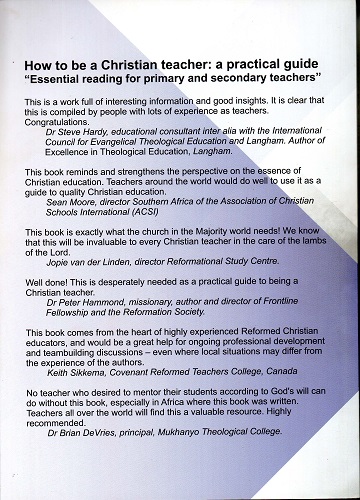Table of contents
Introduction
Part 1 The task and role of the Christian teacher
1.1 What makes a Christian teacher
1.2 Being a teacher is a calling
1.3 The example of Jesus Christ
1.4 The teacher as educational leader
1.5 The teacher as curriculum developer
1.6 The teacher as pastor
1.7 Christian teaching methodology
1.8 The teacher’s relationship with others
1.9 Staff matters
1.10 A code of conduct for Christian teachers
Part 2 Forming and guiding learners
2.1 How Christian teachers perceive their learners
2.2 The purpose of Christian education
2.3 The moral formation of learners
2.4 The forming of learners in practice
2.5 Learning and behaviour challenges
2.6 Evaluation, achievement and reward
2.7 Order and discipline
2.8 Preparation of adulthood
2.9 Leadership for development
2.10 Mutual relationships
Part 3 Defining a Christian school
3.1 Why Christian schools?
3.2 Establishing a Christian school
3.3 Christian schools in the community
3.4 Christian schools are unique
3.5 Establishing and consolidating a school’s Christian character
3.6 Further important aspects
3.7 The role of management
3.8 Christian teachers in non-Christian schools
3.9 Teachers in mission schools
3.10 Self-assessment
Part 4 Subject approaches for primary and secondary teachers
4.1 God’s relevation in every subject
4.2 Languages
4.3 Mathematics
4.4 Natural sciences
4.5 Economic sciences
4.6 History
4.7 Geography
4.8 Art, drama and music
4.9 Technological sciences
4.10 Life Orientation
Part 5 Foundations
5.1 The Bible in a Christian school
5.2 Life- and worldview in relation to education
5.3 Science through Christian eyes
5.4 A Christian education
5.5 God as Truth
5.6 Bible instruction
5.7 The telling of Bible stories
5.8 Other aspects concerning Bible instruction
5.9 The task of government
5.10 A short review of the history of Christian education
Appendix: The Bible on education
Authors’ profiles
Pieter Bisschoff comes from a teaching family, studied at the then Potchefstroom College of Education and at Unisa (HED, BA Hons), and then taught for 23 years, of which 15 years were as Principal of the Gereformeerde Skool Dirk Postma in Pretoria. In 2005 he founded the Aros (Akademie Reformatoriese Onderwys en Studies; Academy of Reformed Studies and Training), a private Christian college of education in Pretoria, and served as its executive head. Subsequently he managed the teacher training department of Mukhanyo Theological College. At present he serves the Bo Karoo Opleiding as its campus principal. Rob van der Kooy studied at the University of Pretoria (BA Hons and MA)`and has worked as a financial journalist, development economist and publisher. He has been involved in Christian education for over 20 years, initially as chairman of the management body of the Gereformeerde Skool (Refortmed School) Dirk Postma (part-time), and thereafter as Dirk Postma’s director (full-time). He also co-founded Aros and served as its director. Since his retirement he has been involved part-time at Mukhanyo Theological College.
